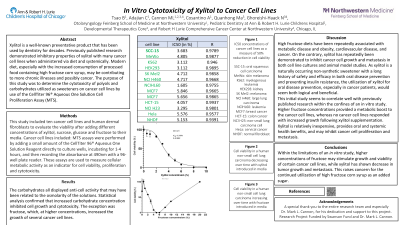Preventive
144 - In Vitro Cytotoxicity of Xylitol to Cancer Cell Lines

- BT
Brice Tsao, DDS
Resident
Ann and Robert H. Lurie Children’s Hospital of Chicago, Chicago, IL
Northwestern Feinberg School of Medicine
Chicago, Illinois, United States - MC
Mark L. Cannon, DDS, MS
Research Mentor
Ann & Robert H. Lurie Children's Hospital of Chicago
Chicago, Illinois, United States - AC
Ashlee Cosantino, DDS
Ann & Robert H. Lurie Children's Hospital of Chicago
Chicago, Illinois, United States
Presenting Author(s)
Research Mentor(s)
Program Director(s)
Purpose: Modern diet with the increased consumption of processed foods, especially containing high fructose corn syrup, may be contributing to more chronic illnesses and possibly cancer. To determine the cytotoxicity, if any, of carbohydrates utilized as sweeteners on cancer cell lines by use of the CellTiter 96® AQueous One Solution Cell Proliferation Assay (MTS).
Materials and
Methods: Ten cancer cell lines (experimental) and human dermal fibroblasts (control) were evaluated for viability after the addition of different concentrations of xylitol, sucrose, and fructose to their media. The cytotoxicity of the carbohydrate was determined by assays performed by adding a small amount of the CellTiter 96® Aqueous One Solution Reagent directly to culture wells, incubating for 1–4 hours, and then recording the absorbance at 490nm with a 96-well plate reader.
Results: The carbohydrates all displayed anti-cell activity that may have been related to the osmolarity of the solutions. Statistical analysis confirmed that increased carbohydrate concentration inhibited cell growth and cytotoxicity. The exception was fructose, which, at higher concentrations, increased the growth of several cancer cell lines.
Conclusion: Within the limitations of an in vitro study, fructose at higher concentrations may stimulate the growth of certain cancer cell lines. This is in accordance with other published research studies and should increase concern over the commonplace utilization of high fructose corn syrup as an added sugar.
Identify Supporting Agency and Grant Number:
Research supported by the Developmental Therapeutics Core at Northwestern University and the Robert H. Lurie Comprehensive Cancer Center support grant (NCI CA060553)

.jpg)